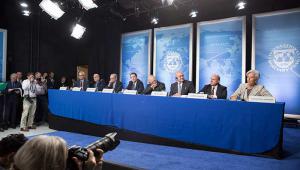The special project meeting of the Joint International Tax Shelter Information and Collaboration Network, consisting of tax administration officials with responsibility for responding quickly to global compliance risks, will take place on Wednesday 13 April and is expected to generate ideas for collaborative action.
The OECD pointed out that last week’s Panama Papers revelations, which exposed the murky world of offshore companies in over 11 million documents from Panama-based law firm Mossack Fonseca, contained transactions spanning a number of jurisdictions and involving multiple entities and individuals.
JITSIC will consider possibilities for cooperation and information-sharing, identify risks and agree on a collaborative response.
“As a network of tax administrations committed to sharing intelligence and working together to tackle common risks, the JITSIC network is well-placed to take on this challenge,” the OECD said.
Just last September, the OECD announced what it described as a radical overhaul of the international tax architecture, intended to prevent wealthy companies and individuals from exploiting tax havens and loopholes to shirk their tax dues.
The fact that they didn’t address the issues sparked by the Panama Papers, or in the eyes of some commentators even the problems they were explicitly focused on fixing, may cast doubt for some on the think-tank’s ability to take the lead this time.
Since the publication of the OECD’s package of reforms to tackle base erosion and profit shifting, there have been calls for a shift in global tax guardianship from the OECD to a more representative institution like the United Nations.
On Friday, the UN’s independent expert on foreign debt and human rights, Juan Pablo Bohoslavsky, stressed the need to end tax secrecy.
“Tax evasion destroys trust in public institutions and the rule of law, and shrinks the fiscal space for investing in public health care, education, social security and other goods and services,” he said.
“Public funds that are essential to guarantee economic, social and cultural rights to all are robbed from the people.”
He noted that, while Mossack Fonseca’s clients may have had a variety of motives for depositing their assets into more than 210,000 secret shell companies, “tax evasion, hiding corruption and criminal funds” appear to be the “prominent” reasons.
He called on governments to publicise the hidden owners of offshore companies, and to make that a legally binding requirement, to end harmful banking secrecy, improve automatic exchange of tax information and to ensure financial institutions that facilitate illegal activities are held to account.
He stressed that measures must ensure developing countries are on an equal footing with their richer counterparts.
Since hitting the headlines last Sunday, the Panama Papers’ revelations have taken the world by storm, naming and shaming all those that made use of Mossack Fonseca’s services in the last four decades.
By Tuesday, the Icelandic prime minister had been forced to resign as mass protests in the capital Reykjavik threatened to spark a snap election.
Several thousand people also protested in Malta yesterday, calling for the resignation of the prime minister Joseph Muscat after two of his political allies were found to have offshore accounts.
Last week Panama’s government announced it would create an international panel to help improve transparency, and today the UK has announced a probe into 700 leads on possible tax evasion and money laundering revealed in the documents. South Africa and France have also vowed to investigate any of their citizens involved.
New Zealand also today announced a review of foreign trust disclosure rules, but both major parties in Australia are reluctant to take any action.
The European Union is pressing ahead with plans for a public register of beneficial owners, Switzerland is stepping up scrutiny of its banks, and the African Union is urging the continent’s nations to start their own investigations.
China however has taken a different but predictable approach after the papers revealed eight current or former communist party leaders have offshore companies, including president Xi Jinping. China has removed all web posts regarding the Panama Papers, blocked foreign websites and castthe episode as a scheme from the west to discredit non-western leaders.













